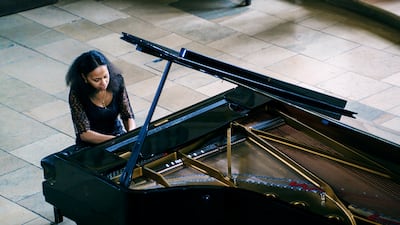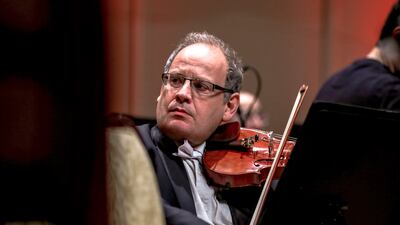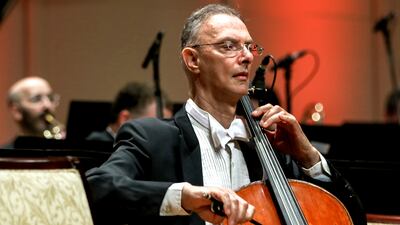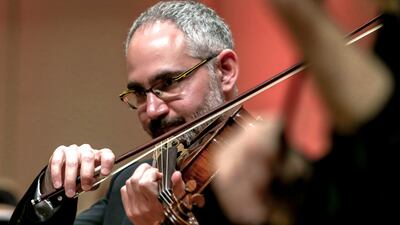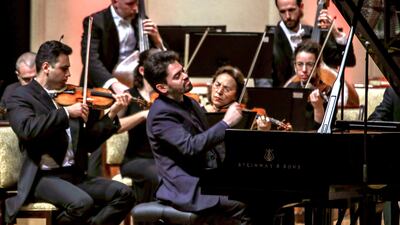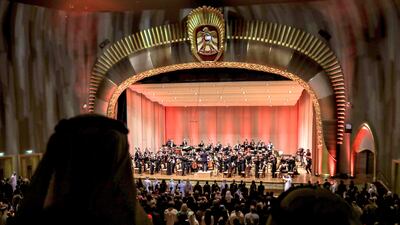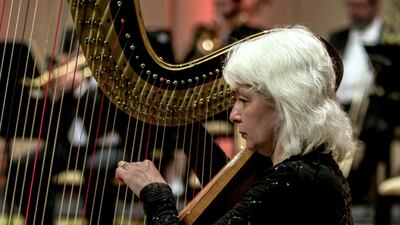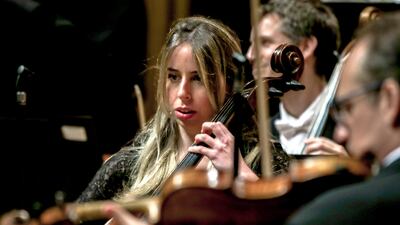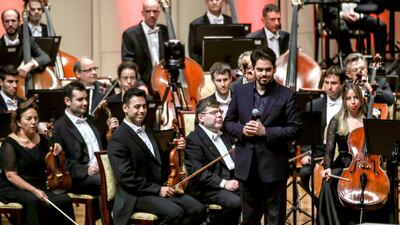Music from Africa is having its moment thanks to the likes of chart-topping Nigerian Afro-pop or the gospel and house fusion of amapiano, a South African electronic music genre filling clubs from Johannesburg to Ibiza.
Another sound, more gentle yet no less immersive, also doing the rounds is African classical music.
Bringing this rich and underappreciated form to light is Nigerian-Romanian pianist Rebeca Omordia who, for the past decade, has been unearthing and recording compositions by some of the continent’s influential past and present composers. As a result, she will perform a selection of them during a recital at Abu Dhabi's Manarat Al Saadiyat on Friday, capping off the season's Abu Dhabi Classics concert series.
The works comprise her acclaimed new album African Pianism, which received rave reviews from classical music magazine Gramophone and was featured on BBC Radio.
The attention is deeply gratifying for Omordia, considering the partly academic approach she adopted while recording.
"This album consists of music from all over Africa so a lot of research was done when it comes to presenting this repertoire," she tells The National. "I wanted to tap into and showcase the different traditions of music from all over the continent and give some of these composers the recognition that they deserve."
Local heroes
While some of the names are not immediately recognisable, African Pianism features composers whose work reverberated in their respective homelands.
They include the late Ayo Bankole — represented in the opener Egun Variations in G major — a graduate of London's Guildhall School of Music and Drama who went on to become an influential composer for Nigerian television and radio in the 1960s.
Also featured is a piece from South African composer David Earle and a trio of nocturnes by Nabil Benabdeljalil from Morocco.
With many of the 21 tracks in African Pianism being released for the first time, Omordia recalls digging out these scores through research trips to Nigeria and Morocco.
There, she engaged with composers and the families of those deceased, in addition to scouring the records in classical music institutes and conservatories in Lagos.
“Then of course are the events where a lot of these composers, who are still with us, can be found and where we connected,” she says.
One of these niche gatherings was a piano competition in Casablanca where Benabdeljalil, a composer and musicologist at the University of Hassan II, was on the jury.
"He was amazed to discover that there was someone out there interested in recording this kind of music,” Omordia recalls. “I was also excited because, through Benabdeljalil’s work, I was able to discover a different musical language within African classical music.”
Omordia is referring to the suite of his sumptuous nocturnes recorded for the album.
“The nocturne is normally associated with European composers using the genre to express themselves through this deeply lyrical, slow and beautiful music," she says. "What Benabdeljalil does is a kind of reinvention in that he uses completely different melodies taken from Moroccan and Arabic culture.
“We would have Zoom sessions and he would sing the melodies for me so I can learn how to play them."
A dynamic repertoire
These delicate works are in contrast with some of African Pianism's energetic scores.
Five Kaleidoscopes for Piano by Ghanaian-American Fred Onovwerosuoke is defined as pensive motifs and undulating melodies. While the vigorous third and final part of Ufie by Nigeria's Christian Onyeji is inspired by the dances of the country's ethnic Igbo community.
Those juxtapositions are essential to African Pianism Omordia says, to showcase the diversity of classical music from the continent.
"An example is the comparison between the music from North and West Africa which are totally different cultures. In West Africa, the classical musical tradition is based on using the piano as a tuned percussive instrument. This is because it is linked to traditional non-classical Nigerian music, which incorporates many percussive instruments,” she explains.
“While North African is traditionally slower with more lyrical melodies."
Omordia is pleased many parts of the world are tuning into her passions.
Her Abu Dhabi Classics concert is part of a growing calendar of engagements including the UK, Spain and the Caribbean.
While music from Africa is receiving unprecedented global attention at present, she says these strides were made on the back of pioneering composers of the past.
"I have to insist that this work has been done for many generations and we are not the first ones to bring this rich cultural heritage to the world," she says. "It's coming to light now because, finally, the world is interested to listen to what comes from Africa other than our natural resources.
African Pianism by Rebeca Omordia at the Manarat Al Saadiyat on Friday at 8pm. Tickets, starting at Dh75, are available at ticketmaster.ae
